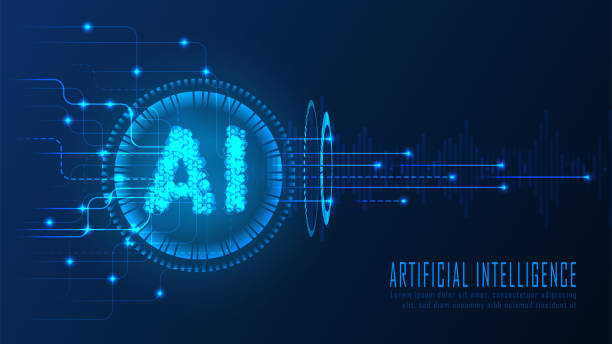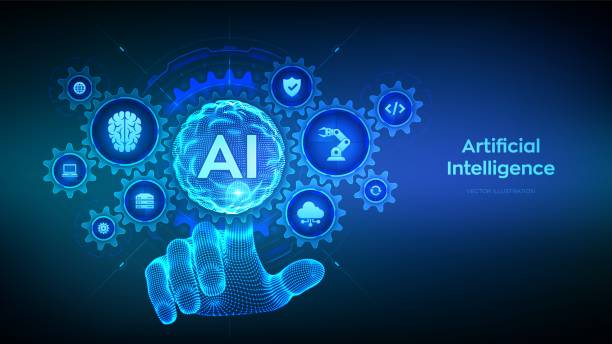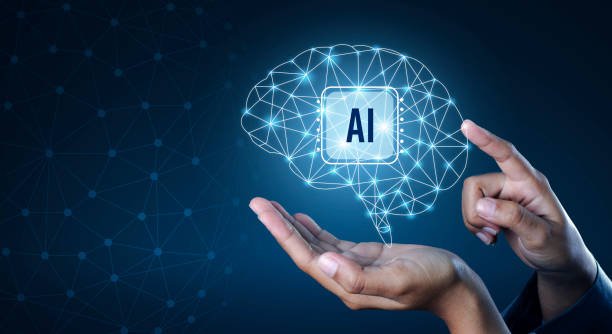The Rise of Mobile AI Applications and Their Transformation of Daily Life

In today’s fast-paced world, the concept of #Artificial_Intelligence is no longer limited to science fiction; instead, it has become a tangible reality embedded in the heart of our everyday devices.
The emergence of #Mobile_AI_Applications marks a turning point in this digital #transformation.
These software tools, leveraging advanced algorithms and the ability to learn from data, are capable of performing tasks previously thought to be exclusive to human abilities.
From intelligent voice assistants that organize our daily tasks to applications that transform photos into works of art or even assist in diagnosing illnesses, each is a clear example of the unparalleled power of this #technology.
These applications have increasingly become an integral part of the user experience of our smartphones, changing how we interact with the world around us.
By analyzing vast amounts of data, they can identify patterns and make accurate predictions that help users make better decisions.
These explanatory and informative capabilities demonstrate how mobile AI applications are redefining the boundaries of technology and possibilities, fundamentally enhancing our daily lives.
These applications are not just new tools, but smart solutions for confronting modern challenges and hold immense potential for future innovations.
Did you know that 94% of users’ first impressions of a business are related to its website design? With professional corporate website design by **Rasawab**, turn this initial impression into an opportunity for growth.
✅ Attract more customers and increase sales
✅ Build credibility and trust in the audience’s view⚡ Get a free website design consultation!
Behind Smart Mobile Applications: Key Technologies

The foundation of any powerful mobile AI application lies in a set of advanced technologies that enable intelligent processing, learning, and decision-making.
At the core of these technologies are Machine Learning and Deep Learning.
Machine Learning allows applications to learn patterns from data and improve their performance without explicit programming.
Deep Learning, a subset of machine learning, is inspired by the structure of the human brain (artificial neural networks) and has the ability to analyze the most complex data such as images, sounds, and texts.
These neural networks can process different layers of information and understand abstract concepts.
Many of these applications use a combination of “On-device Processing” (On-device Processing) and “Cloud-based Processing” (Cloud-based Processing).
On-device processing means that AI models run directly on the phone, eliminating the need for a constant internet connection or sending data to cloud servers.
This helps preserve data privacy and increases response speed.
In contrast, cloud-based processing is used for more complex tasks that require high processing power and access to vast amounts of data.
This specialized combination of technologies enables mobile AI applications to deliver intelligent performance with minimal latency and maximum accuracy.
Understanding these fundamental principles of data science and software engineering is essential for anyone interested in the world of artificial intelligence.
Countless Benefits of Mobile AI Applications for Users and Businesses

Mobile AI applications are not just entertainment tools; they bring profound and extensive benefits to individuals’ daily lives and business operations.
At the individual level, these applications save our time and increase efficiency by personalizing the user experience.
For instance, smart assistants simplify scheduling, or health applications enable continuous monitoring of physical condition.
This level of accessibility and convenience has made life simpler for many.
For businesses, the benefits are even more striking.
Mobile AI can automate processes, analyze data more intelligently, and provide valuable insights.
This helps companies make better decisions, reduce costs, and improve customer experience.
From intelligent chatbots for customer support to analytical tools that identify purchasing patterns, mobile AI applications have become a competitive advantage.
These applications allow businesses to penetrate new markets and offer more innovative services.
These analytical and guidance-providing benefits demonstrate why investing in mobile AI application technology is crucial for both individual and business sectors.
These applications are not merely a luxury gadget; they form the backbone of an efficient and dynamic digital ecosystem.
| Area | Main Benefit | Application/Use Case Example |
|---|---|---|
| Individual Users | Personalization and Convenience | Voice assistants (e.g., Siri, Google Assistant), content recommenders (Netflix, Spotify) |
| Health and Wellness | Smart Monitoring and Prevention | Fitness tracking apps, early skin disease detection apps |
| Education | Adaptive Learning and Easy Access | Language learning apps (e.g., Duolingo), personalized educational platforms |
| Small Businesses | Increased Productivity and Automation | CRM tools with AI capabilities, support chatbots |
| Large Corporations | Big Data Analysis and Strategic Decision-Making | AI-powered BI (Business Intelligence) tools, supply chain optimization |
Diverse Applications of Mobile AI in Various Aspects of Life

Mobile AI applications have literally permeated every aspect of our lives, and new applications are discovered daily.
Beyond being merely entertaining, these applications have become educational and assistive tools that make life easier for us.
In the health sector, fitness tracker apps can monitor your physical activities, heart rate, and even sleep patterns, offering personalized recommendations for health improvement.
Some of the most advanced applications, even using computer vision, are capable of analyzing initial medical images and assisting in the early diagnosis of certain conditions.
In the field of education, mobile AI applications have revolutionized the learning experience.
Language learning apps, by detecting accents and providing immediate feedback, make the learning process faster and more effective.
Smart educational platforms can analyze each student’s learning style, provide personalized educational content, and identify weaknesses.
Even in the entertainment sector, mobile AI applications have much to offer.
From augmented reality filters in social networks that alter your images to mobile games that, with adaptive AI, make the gaming experience unique for each user.
Music and movie recommendation systems also leverage AI to suggest content you might like based on your taste.
These applications demonstrate how mobile AI is continuously enriching our digital and real lives and pushing the boundaries of possibility.
Does your current corporate website not reflect your brand’s credibility and strength as it should? Rasawab solves this challenge for you with professional corporate website design.
✅ Increase visitor credibility and trust
✅ Targeted attraction of more customers
⚡ Click for a free consultation!
Challenges and Obstacles Facing the Development and Use of Mobile AI
![]()
Despite all the benefits that mobile AI applications bring, their development and widespread use also come with significant challenges.
One of the biggest concerns is data privacy and security.
Since these applications access and process large amounts of personal information, protecting this data from misuse or security breaches is crucial.
Ethical considerations are also at play; for example, concerns about bias in algorithms that can lead to discrimination or unfair decisions.
Another challenge is processing power and energy consumption.
Running complex AI models on mobile devices can put significant strain on the phone’s processor and battery.
Developers must implement many optimizations to reduce power consumption and maintain proper performance.
Furthermore, for many applications, a stable internet connection is required to access cloud resources, which can be a limitation in areas with poor coverage.
Moreover, the issue of data quality and model training is also very important.
AI models perform only as well as the data they were trained on; therefore, collecting high-quality and diverse data, as well as ensuring the absence of bias, is a specialized and complex process.
These issues raise questionable content regarding the future and sustainability of mobile AI applications, which requires innovative solutions and international cooperation.
A Bright Future with Emerging Trends in Mobile AI

The future of mobile AI applications is very bright and full of innovation.
One of the most important emerging trends is Edge AI.
This concept refers to running AI algorithms directly on the device (Edge device) rather than in the cloud.
This approach not only minimizes latency but also improves data security and privacy, as sensitive data never leaves the device.
This trend is crucial, especially in areas such as autonomous driving and the Internet of Things (IoT), which require fast and reliable responsiveness.
Furthermore, we will witness Federated Learning, which allows multiple devices to collaboratively train an AI model without sending their raw data to a central server.
This helps preserve user privacy while simultaneously increasing the accuracy of AI models.
Mobile AI applications in the future will be further integrated with Augmented Reality (AR) and Virtual Reality (VR), offering immersive and unprecedented user experiences.
Imagine applications that analyze environmental information in real-time and display intelligent guidance over your camera’s feed.
Another trend is the further development of more advanced Natural Language Processing (NLP) and smart assistants with more natural conversational capabilities and a deeper understanding of user intent.
These advancements promise an analytical and informative future where smart mobile applications not only simplify our tasks but also become intelligent partners in our daily lives.
These advancements clearly demonstrate the immense potential of mobile AI applications.
Guide to Choosing the Best Mobile AI Application for Your Needs

In a world full of mobile AI applications, choosing the right option for your specific needs can be challenging.
To make the best decision and maximize your investment, you need to consider a few key criteria.
The first and most important criterion is suitability for your needs.
Before downloading any application, think about exactly what problem you want to solve or what task you want to automate.
Do you need an assistant for time management? Or a photo editing tool with AI capabilities?
After that, pay attention to security and privacy.
Since these applications often access your personal information, ensure that the application developer adheres to high security standards and has transparent privacy policies.
Reading user reviews and checking application ratings in app stores can also be a good guide for assessing the reliability and quality of the application.
Ease of use and user interface are also highly important.
A powerful mobile AI application truly shows its value when it is easy and intuitive to use.
Excessive complexity can disrupt the user experience.
Finally, pay attention to support and regular updates.
A good application is regularly updated to fix bugs and add new features.
This educational guide encourages you to choose wisely so that mobile AI applications serve you best.
| Criterion | Description | Importance |
|---|---|---|
| Suitability for Needs | Does the app precisely solve your problem or meet your need? | Very High |
| Security and Privacy | Adherence to security standards and transparent data privacy policies. | Very High |
| User Interface (UI) and User Experience (UX) | Ease of use, visual design, and app appeal. | High |
| User Reviews and Ratings | General user feedback on app performance and stability. | Medium to High |
| Support and Updates | Provision of active support and regular updates for improvements and bug fixes. | High |
| Price and Subscription Model | Costs related to the app (purchase, subscription, in-app purchases) and value for money. | Medium |
The Path of Development and Deployment of Mobile AI Applications

Developing and deploying a mobile AI application is a complex, multi-stage process that requires a combination of programming skills, machine learning, and user interface design.
This process typically begins with data collection and preparation.
Data is the fuel for the AI engine, and its quality and volume directly impact the model’s performance.
After collection, data must be cleaned, organized, and labeled to be suitable for training AI models.
The next step is training and optimizing the AI model.
Developers use frameworks like TensorFlow Lite or PyTorch Mobile, which are specifically optimized for deploying AI models on mobile devices.
These frameworks allow large and complex models to be compressed and optimized to be compatible with the limited hardware resources of smartphones.
Optimization includes reducing model size, minimizing memory consumption, and improving inference speed.
Finally, the optimized model is integrated into the mobile application.
This involves developing the user interface for interacting with the model, managing inputs and outputs, and ensuring the smooth operation of the application.
Continuous testing and evaluation to identify and fix bugs and improve model performance after deployment are also highly important.
This specialized and technical process ensures that every mobile AI application performs as optimally as possible and provides a flawless user experience.
Are you dissatisfied with the low sales of your e-commerce website?
Rasawab is your solution for having a professional and high-selling e-commerce website.
✅ Significant increase in sales and revenue
✅ Easy and enjoyable shopping experience for customers
⚡ Get a free consultation from Rasawab now!
Transformative Impacts of Mobile AI on Various Industries

Mobile AI applications, beyond assisting individual users, are fundamentally transforming various industries.
This transformation is clearly visible in every sector of the economy, from healthcare to retail.
In the healthcare industry, these applications are used for remote patient monitoring, assisting in early disease diagnosis through image or sensor data analysis, and even managing and organizing medical records.
These capabilities increase access to healthcare and improve the quality of treatment.
In the retail sector, mobile AI applications assist sellers by providing personalized product recommendations, improving the online shopping experience, and even managing inventory and optimizing the supply chain.
AI chatbots also play a crucial role in customer support and answering user queries.
In the financial industry, mobile AI is used in fraud detection, risk management, and providing personalized investment advice.
Even in agriculture, mobile AI applications help farmers optimize water and fertilizer consumption and predict crop yield by analyzing sensor data.
This analysis shows how AI applications on phones have gone beyond a simple tool and become a driving force for innovation and productivity across a wide range of industries.
These applications enable companies to respond to market needs with greater agility and be leaders in today’s competitive world.
Conclusion and Future Outlook of Smart Mobile Applications

In summary, mobile AI applications are no longer just innovative tools, but have become a critical component in daily life and modern businesses.
From unprecedented user experience personalization to increased productivity across various industries, the impact of these applications is undeniable.
We are witnessing the emergence of tools that can translate languages, diagnose diseases, and even help us learn new skills.
These applications, with their ability to process vast amounts of data and continuously learn, have expanded the boundaries of what we can achieve with a small device in our hands.
With continuous advancements in edge AI, federated learning, and integration with technologies such as augmented reality, mobile AI applications are expected to become even more powerful and ubiquitous in the future.
Challenges such as data privacy, ethical considerations, and the need for processing resources will also persist, but they can be overcome with the development of innovative solutions and supportive regulations.
This final explanation emphasizes that mobile AI applications have not only changed our lives now but will play a central role in shaping our digital future.
They allow us to interact with the world in smarter and more efficient ways and offer infinite potential for future innovations.
Investing and paying attention to this area is essential for any individual and organization that wants to be a leader in the digital age.
Frequently Asked Questions
| No. | Question | Answer |
|---|---|---|
| 1 | What is a mobile AI application? | A mobile AI application is a program that uses artificial intelligence capabilities (such as machine learning, natural language processing, computer vision) to provide smarter and more automated experiences on mobile devices. |
| 2 | Why is AI important in mobile applications? | Its importance stems from increased efficiency, personalized user experience, task automation, improved decision-making, and the provision of innovative features like facial recognition or voice assistants. |
| 3 | What are examples of mobile applications with AI? | Voice assistants (e.g., Siri, Google Assistant), navigation apps with real-time traffic (Google Maps), image filters (Snapchat, Instagram), language translation apps, and facial recognition apps. |
| 4 | What challenges exist in developing mobile AI applications? | Hardware limitations of mobile devices (processing power, battery), need for large and high-quality data, user privacy protection, and the complexity of implementing AI models. |
| 5 | What is the role of machine learning in these applications? | Machine learning allows the application to learn from data, identify patterns, and improve its performance over time, such as in product recommendation systems or speech recognition. |
| 6 | Do mobile AI applications require an internet connection? | Many advanced AI features require an internet connection and cloud processing, but some lighter models can also work “on-device” (without internet). |
| 7 | How does AI help improve the user experience on mobile? | By personalizing content, anticipating user needs, automating repetitive tasks, and providing more natural user interfaces like voice commands. |
| 8 | What is the difference between cloud AI and on-device AI in mobile? | Cloud AI uses powerful servers for processing (requires internet), while on-device AI performs processing directly on the phone itself (no internet required, but with processing limitations). |
| 9 | What will be the future of mobile AI applications? | We expect to see increased personalization capabilities, deeper integration with phone sensors, development of smarter assistants, and advancements in on-device processing. |
| 10 | Which frameworks are popular for AI development in mobile? | TensorFlow Lite (for Android and iOS), Core ML (for iOS), and PyTorch Mobile are among the popular frameworks for implementing AI models in mobile applications. |
And other services of Rasa Web Advertising Agency in the field of advertising
Smart Reportage: A novel service for increasing sales through dedicated programming.
Smart Advertising Campaign: A creative platform for improving customer acquisition with Google Ads management.
Smart Marketing Automation: A fast and efficient solution for digital branding with a focus on SEO-driven content strategy.
Smart Data Analysis: A professional solution for improving SEO ranking with a focus on intelligent data analysis.
Smart Marketplace: A professional solution for digital branding with a focus on intelligent data analysis.
And over hundreds of other services in the field of internet advertising, advertising consulting, and organizational solutions
Internet Advertising | Advertising Strategy | Advertorial
Resources
Digital Transformation and Artificial IntelligenceThe Future of Technology with Mobile AIImportance of Smart Applications in the New EraThe Role of AI in Industry Transformation
? For your business to shine in the digital world and achieve its lofty goals, Rasaweb Afarin Digital Marketing Agency is by your side with its expertise and experience. We pave your path to growth by providing comprehensive digital marketing solutions, including website design with a modern user interface, SEO, online advertising, and social media management.
📍 Tehran, Mirdamad Street, next to Bank Markazi, Kazeroon Jonoubi Alley, Ramin Alley, No. 6




